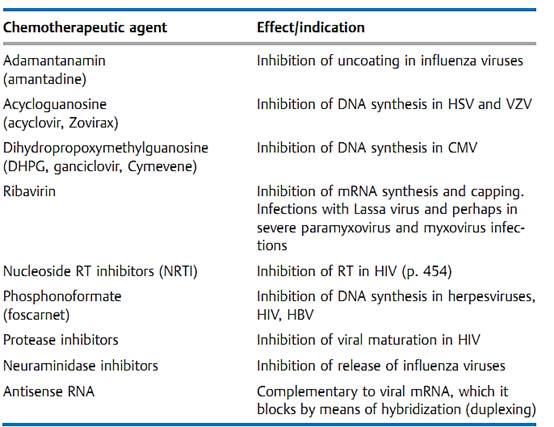


 النبات
النبات
 الحيوان
الحيوان
 الأحياء المجهرية
الأحياء المجهرية
 علم الأمراض
علم الأمراض
 التقانة الإحيائية
التقانة الإحيائية
 التقنية الحيوية المكروبية
التقنية الحيوية المكروبية
 التقنية الحياتية النانوية
التقنية الحياتية النانوية
 علم الأجنة
علم الأجنة
 الأحياء الجزيئي
الأحياء الجزيئي
 علم وظائف الأعضاء
علم وظائف الأعضاء
 الغدد
الغدد
 المضادات الحيوية
المضادات الحيوية|
Read More
Date: 18-11-2015
Date: 10-11-2020
Date: 18-11-2015
|
Chemotherapy
Inhibitors of certain steps in viral replication can be used as chemotherapeutic agents to treat viral infections. In practical terms, it is much more important to inhibit the synthesis of viral nucleic acid than of viral proteins. The main obstacles involved are the low level of specificity of the agents in some cases (toxic effects because cellular metabolism is also affected) and the necessity of commencing therapy very early in the infection cycle.
Problems of chemotherapy. As described on viral replication is completely integrated in cell metabolism. The virus supplies only the genetic information for proteins to be synthesized by the cell. This close association between viruses and their host cells is a source of some essential difficulties encountered when developing virus-specific chemotherapeutics, since any interference with viral synthesis is likely to affect physiological cellular synthetic functions as well. Specific intervention is only possible with viruses that code for their own enzymes (e.g., polymerases or proteases), which enzymes also react with viral substrates. Another problematic aspect is the necessity of administering chemotherapeutics (Table 1) early, preferably before clinical symptoms manifest, since the peak of viral replication is then usually already past.
Table 1 The Most Important Antiviral Chemotherapeutics

Development of resistance to chemotherapeutics. Acyclovir-resistant strains of herpesviruses, in particular herpes simplex viruses, are occasionally isolated. Less frequently, cytomegaly viruses resistant to ganciclovir are also found. These viruses possess a thymidine kinase or DNA polymerase altered by mutation. Infections caused by resistant herpesviruses are also observed in immunodeficient patients; the pathogens no longer respond to therapy after long-term treatment of dermal or mucosal efflorescences.
There are, as yet, no standardized resistance tests for chemotherapy-resistant viruses, so that the usefulness of such test results is of questionable value in confirmed cases. Also, the results obtained in vitro unfortunately do not correlate well with the cases of resistant viruses observed in clinical settings.
References
Fritz H. Kayser, M.D. Emeritus Professor of Medical Microbiology Institute of Medical Microbiology, University of Zurich, Zurich, SwitzerlandThieme 2005, Stuttgart ! New York.



|
|
|
|
علامات بسيطة في جسدك قد تنذر بمرض "قاتل"
|
|
|
|
|
|
|
أول صور ثلاثية الأبعاد للغدة الزعترية البشرية
|
|
|
|
|
|
|
وفد كلية الزراعة في جامعة كربلاء يشيد بمشروع الحزام الأخضر
|
|
|